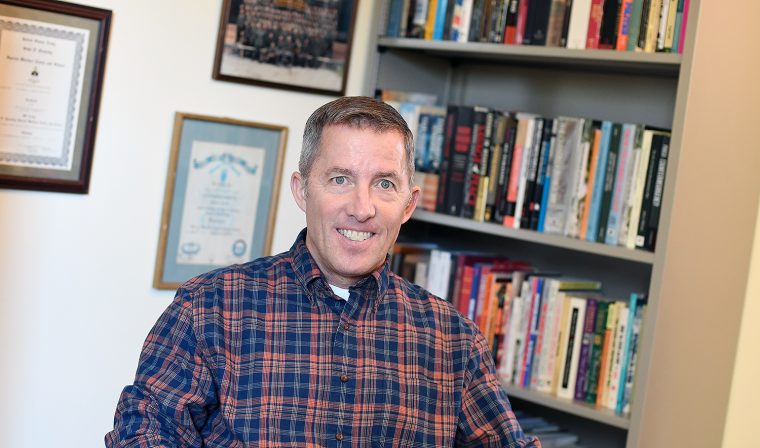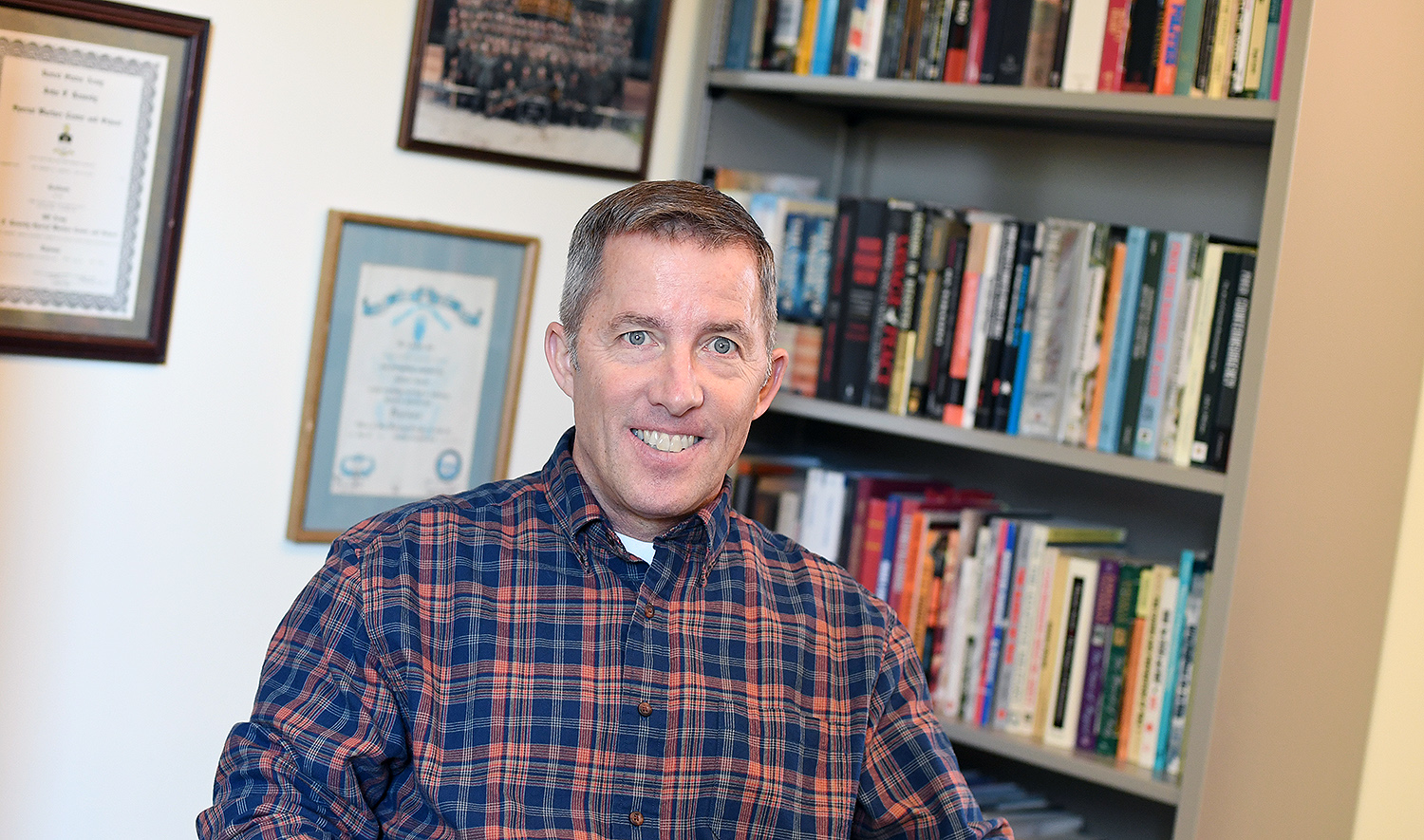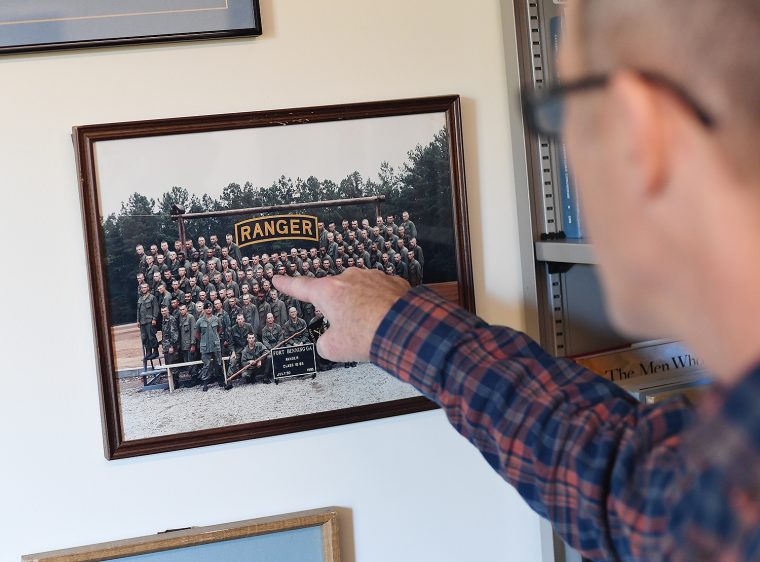Col. Cassidy Is Wesleyan’s First Retired Military Officer Teaching Fellow


In this Q&A, and in honor of Veterans Day on Nov. 11, Retired Military Officer Teaching Fellow Robert “Bob” Cassidy speaks about his military career, thoughts on the Iraq invasion and teaching at Wesleyan. (Brandon Sides ’18 contributed to this article.)
Q: How did you acquire your teaching fellowship at Wesleyan?
A: I received a Retired Officer Teaching Fellowship (ROTF) through the Chamberlain Project, which supports fellowships at some of the nation’s top liberal arts institutions. Fellows are required to work on building relationships and understanding between the U.S. Armed Services and civilian institutions and to contribute to the richness and diversity of students’ educational experiences. We also teach two full-credit courses. This fall and next spring, I am teaching a seminar on Policy and Strategy in War and Peace at the Center for the Study of Public Life.
Q: What material is covered in this course?
A: We explore the meaning of civilian-military relations and how those relations interact with our ability to align policy and strategy. We start with the Vietnam War and cover eight wars through the present. So far this semester, we’ve studied the Vietnam War, the Persian Gulf War, the peace operations and combat operations in Somalia, the initial war in Afghanistan, and this week, we cover the bad decisions behind the invasion of Iraq. We will end with a look at where we are now with policy and strategy, and the wars in Afghanistan and elsewhere against the likes of the Islamic State.

Q: When did you join the military and where have you served?
A: I enlisted in the U.S. Army in 1981 and completed the United States Army Ranger School in 1985. After obtaining sergeant rank, I served in the Army National Guard until I was commissioned through ROTC in the U.S. Army as a Distinguished Military Graduate. Then I served in combat and contingency operations in Grenada, Haiti, Iraq and Afghanistan a special assistant to two senior commanders in Afghanistan, a director of assessments for the Special Operations Joint Task Force–Afghanistan, a Task Force 714 chief planner and liaison to the Afghan theater commander, a battalion commander in Kuwait, a special assistant to the U.S. Army Europe Commander, a brigade operations officer in Iraq, a squadron executive officer in the 4th Infantry Division, an air cavalry troop commander and Russian interrogator in the 82nd Airborne Division, a Russian interrogator and as a support and scout platoon leader in the 8th Infantry Division.
Q: Where were you preceding the Iraq invasion in 2003?
A: I was a major in the U.S. Army 4th Infantry Division at Fort Hood, Texas, serving as a brigade operations officer.
Q: What was your perspective on the idea of invading Iraq?
A: It occurred to me before we even went into Iraq [that the invasion would be a mistake]. I had studied the Soviet war in Afghanistan and the Russian war in Chechnya. I studied irregular warfare and stability operations, for example the operations in Somalia and Bosnia, as part of my dissertation…. I was of the personal conviction that Iraq was a very bad idea—and I’m not saying this in hindsight. When 9/11 happened, I was unfortunate in that I was in a division that was earmarked for Iraq early on. Even though I was of the conviction that Afghanistan was the war of necessity and that Iraq was a diversion, it was pretty much inevitable that we were going to Iraq.
Q: What made you more skeptical of the United States’ war and the aims in Iraq?
A: While in Egypt, I was serving as a commander in a battalion in Central Command, which is the overarching command for the Middle East and South Asia. And we were doing Bright Star, which was an exercise we did every two years with the Egyptians.… I was reading The War for Muslim Minds by Gilles Kepel, which is about the neocons, and the radical Islamists inside the Islamic world [versus] everyone else, the majority of the Ummah [broader Muslim world] … I had a kind of epiphany, which may have been a rather maladroit use of a word, considering the region. We were at the Bright Star exercise operating with all of our allies in the region, including Egypt, and I’m thinking, “This, what we’re doing right now as a country is ridiculous. Because we’re ostensibly trying to fight and prevail in Iraq, to make it a democratic bastion in the Middle East, yet we’re allied with all these other tin-pot tyrants in the Middle East.” So I didn’t think the idea was there—wasn’t sound, wasn’t rational, wasn’t compelling.… How are you going to prevail in a war of ideas, which it was really about, which 9/11 was really about, if you’re allying with people that are anathema to the ideas you say you’re fighting for?
Q: What is your educational background?
A: I have a BA in history from Fitchburg State College; an MA in international relations from Boston University; an MA in law and diplomacy from the Fletcher School at Tufts University and a PhD from the Fletcher School. My dissertation title, which is a mouthful, was “The Uptonian Paradox and the Cardwellian Conundrum: A Comparison of American and British Military Strategic Cultures and the Development of Peace Operations Doctrine, 1990–1995.” I also completed graduate degrees in strategy and security studies at the École de Guerre in Paris and the U.S. Naval War College in Newport, Rhode Island.
Q: Tell us about your scholarly interests.
A: My work explores strategy, irregular war and military culture, specifically comparative studies on peace operations in Bosnia and Somalia, the Soviet and Russian wars in Afghanistan and Chechnya, and the post-2001 insurgencies in Afghanistan and Pakistan. I am passionate about exploring and questioning the costs and consequences of a propensity for tactics over strategy that afflicts the United States and its partners in the wars since 9/11.
Q: Are you familiar with Wesleyan’s Posse Veterans Program?
A: It’s great that Wesleyan is in the lead with this particular program. When I found out about the Veterans Posse here, I realized that it’s an interesting and wonderful program. Wesleyan and its leadership are at the forefront of something that brings diversity in a different way: It brings veterans with the potential to succeed here academically … and it just makes Wesleyan a little bit more diverse than it already is. It’s better to have different people. It makes the whole thing rich. Veterans Posse does that. It’s clear that the veterans’ community is very grateful for what [President] Michael Roth and the administration are doing here.
Q: You recently spoke to students in Peter Gottschalk’s Cinematic Encounters: Muslims and/in/of the West course. What was your experience?
A: My experience in that class was a good one. The students asked challenging questions, and I had a moment in that class where I said, “This is why I’m here.” A student asked, because of my experience in the military and because many of us in the military have spent a lot of time in the Middle East fighting wars in the last many years, “Do you think there are more ‘Islamophobes’ in the military?” And I thought that was a great question. I said, “The military’s a microcosm of society. I don’t have any polling data, but let’s say there are Islamophobes in the military, and there are Islamophobes in our society. But we also have very serious and thinking people in the military with keen intellects, and they know the difference between Islamist and Islamic in terms of the small fraction that are militants.” But then I thought, “This is rich. This is actually us fulfilling the purpose of this fellowship. Because it’s not just about me; it’s about we. I’m here, I integrate with faculty and students, and I share what I know in a candid and thoughtful fashion. That adds richness in the experience of everybody.”

